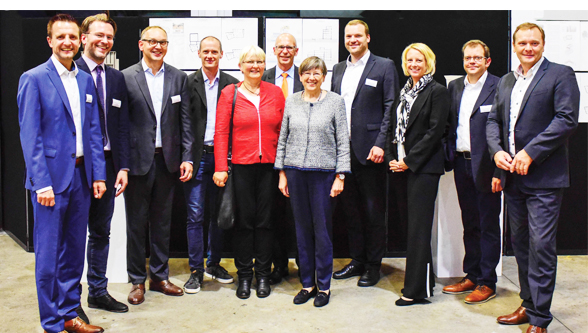The FADZ Research and Application Centre for Digital Future Technologies has launched a new master’s programme “Additive Manufacturing and Lightweight Engineering” at the Coburg University of Applied Sciences and Arts in Lichtenfels. For the launch of the programme, politicians of the region and from the Free State of Bavaria, representatives of the Coburg University, and entrepreneurs got together in Lichtenfels.
Some 170 guests of the new FADZ met to discuss education and opportunities of digital transformation. At a promotional event on 26 September 2019 in Lichtenfels, the FADZ Research and Application Centre for Digital Future Technologies demonstrated its affirmation of the importance of basic and advanced vocational training for digital industrial strategies.
The challenges of the digital transformation affect enterprises of any size, as well as employees in the occupational segments that are subjected to constant change. Following the principle “Think global, act local”, the FADZ positions itself as a bridge builder and ambassador of new digital strategies in the era of Industry 4.0.
It encompasses academic education and research, approaches students and citizens, and strives to offer assistance to small / medium-sized enterprises and crafts on their way towards digital transformation. The FADZ receives support from regional politics, the Free State of Bavaria and the German federal government, and it builds a bridge from the Coburg University to the regional businesses with practical application support and consulting.
“The next step of the digital transformation is the human being. Education and further training now ,need to be strengthened. The tools are in place, now we need to ensure broadscale implementation by means of knowledge transfer for new ideas,” said Frank Carsten Herzog, founder and Managing Partner of the pioneering company Concept Laser.
Thanks to the laser melting process for metals, Herzog created excellent conditions for the “Generation 3D” at the Lichtenfels site. Sharing these competences of the company and the Coburg University with the general public is the mission that the FADZ is now willing to face. “If traditional technologies such as mould-related methods are disruptively replaced by additive processes, we need to involve people and get them on board,” added Herzog.
“With the help of a training campaign, today’s 3D tools can dramatically reshape our concept of processes and products. Basic and advanced vocational training is fundamental to the design of the digital future,” asserted Herzog.



